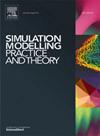Intelligent dynamic bandwidth allocation for real-time IoT in fog-based optical networks
IF 3.5
2区 计算机科学
Q2 COMPUTER SCIENCE, INTERDISCIPLINARY APPLICATIONS
引用次数: 0
Abstract
The rapid proliferation of Internet of Things (IoT) applications has led to an exponential increase in data traffic, which is imposing a significant burden on existing network infrastructures. Ethernet Passive Optical Networks (EPONs) within fog computing environments are critical for supporting real-time IoT applications because of their high bandwidth and low-latency capabilities. However, traditional static bandwidth allocation methods designed for EPONs do not accommodate the dynamic and heterogeneous nature of real-time IoT traffic, leading to inefficient resource utilization and service degradation. This paper proposes a reinforcement learning (RL)-driven fog-based dynamic bandwidth allocation (DBA) framework to optimize resource management in EPONs with multi-optical edge devices (OEDs) within cloud-fog computing environments. The framework improves bandwidth distribution for OEDs connected to IoT access points through a fog server, ensuring adaptive real-time dynamic bandwidth allocation. Specifically, this paper formulates the bandwidth allocation problem as a constrained profit-maximization discounted return problem, which cannot be directly solved using traditional optimization methods due to the dynamic and uncertain nature of the IoT traffic. To effectively solve this problem, this paper models the bandwidth allocation problem as a Markov Decision Process (MDP), which can be solved using RL without requiring prior traffic knowledge. Through a continuous real-time learning process, the proposed algorithm learns the IoT traffic dynamics and then adaptively optimizes bandwidth allocation at the fog layer, resulting in improved system efficiency and adaptability. Simulation results demonstrate that, compared to conventional bandwidth allocation algorithms designed for fog-based EPONs (i.e., equal distribution and moving average algorithms), the proposed RL-based framework significantly improves bandwidth utilization and reduces blocking probability related to IoT networks by dynamically adjusting bandwidth allocation based on the learned real-time traffic.
基于雾的光网络实时物联网智能动态带宽分配
物联网(IoT)应用的快速扩散导致数据流量呈指数级增长,这给现有的网络基础设施带来了巨大的负担。雾计算环境中的以太网无源光网络(epon)由于其高带宽和低延迟能力,对于支持实时物联网应用至关重要。然而,针对epon设计的传统静态带宽分配方法无法适应物联网实时流量的动态性和异构性,导致资源利用效率低下,服务质量下降。本文提出了一种基于强化学习(RL)驱动的基于雾的动态带宽分配(DBA)框架,以优化云雾计算环境下具有多光边缘设备(oed)的epon资源管理。该框架通过雾服务器改善连接到物联网接入点的oed的带宽分配,确保自适应实时动态带宽分配。具体而言,本文将带宽分配问题表述为约束下的利润最大化贴现回报问题,由于物联网流量的动态性和不确定性,传统的优化方法无法直接解决该问题。为了有效地解决这一问题,本文将带宽分配问题建模为马尔可夫决策过程(MDP),该过程可以使用RL来解决,而不需要事先了解流量。通过持续的实时学习过程,学习物联网流量动态,自适应优化雾层带宽分配,提高系统效率和适应性。仿真结果表明,与传统的基于雾的epon带宽分配算法(即等分布和移动平均算法)相比,本文提出的基于rl的框架通过根据学习到的实时流量动态调整带宽分配,显著提高了带宽利用率,降低了与物联网网络相关的阻塞概率。
本文章由计算机程序翻译,如有差异,请以英文原文为准。
求助全文
约1分钟内获得全文
求助全文
来源期刊

Simulation Modelling Practice and Theory
工程技术-计算机:跨学科应用
CiteScore
9.80
自引率
4.80%
发文量
142
审稿时长
21 days
期刊介绍:
The journal Simulation Modelling Practice and Theory provides a forum for original, high-quality papers dealing with any aspect of systems simulation and modelling.
The journal aims at being a reference and a powerful tool to all those professionally active and/or interested in the methods and applications of simulation. Submitted papers will be peer reviewed and must significantly contribute to modelling and simulation in general or use modelling and simulation in application areas.
Paper submission is solicited on:
• theoretical aspects of modelling and simulation including formal modelling, model-checking, random number generators, sensitivity analysis, variance reduction techniques, experimental design, meta-modelling, methods and algorithms for validation and verification, selection and comparison procedures etc.;
• methodology and application of modelling and simulation in any area, including computer systems, networks, real-time and embedded systems, mobile and intelligent agents, manufacturing and transportation systems, management, engineering, biomedical engineering, economics, ecology and environment, education, transaction handling, etc.;
• simulation languages and environments including those, specific to distributed computing, grid computing, high performance computers or computer networks, etc.;
• distributed and real-time simulation, simulation interoperability;
• tools for high performance computing simulation, including dedicated architectures and parallel computing.
 求助内容:
求助内容: 应助结果提醒方式:
应助结果提醒方式:


